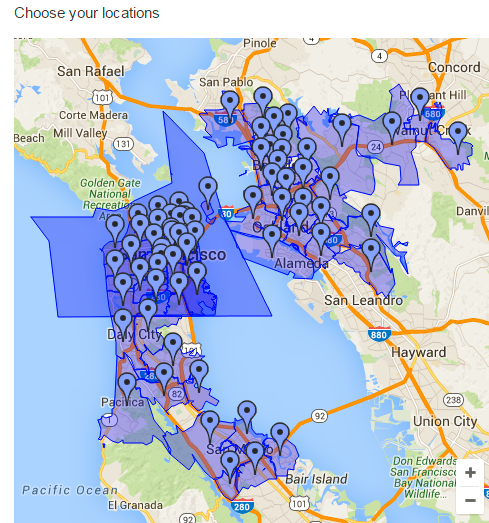By Ashley Mo, Account Manager
On the surface, pay-per-click advertising on Google seems like the ideal marketing solution for small businesses in need of more visitors. Drive traffic to your website and you only have to pay for people who actually click on your ad? Sounds easy enough.
Not so fast! It’s very easy to overspend and come away with no learnings while advertising through Google’s AdWords platform. You want to be smart about how you build your campaigns so that you only drive qualified traffic to your website. With the right setup, even a small business can hit their marketing goals on Google.
Before you get started, ask yourself these five questions to make sure you’re getting the most bang for your buck.
What is your desired on-site action?
Once a visitor lands on your website or app store page, there should be one main action that you want the visitor to take. Perhaps you want them to fill out a form to request more information about your business. Or maybe you run a local service and want to measure the number of phone calls generated. For e-commerce companies, you want your visitor to make a purchase.
It’s best to choose one of these desired actions so you have an end goal in mind as you build your campaigns.
What is your Key Performance Indicator (KPI)?
Choose one KPI that you will use to determine if performance is good or bad. Now that you already know what action you want users to take, you can calculate your Cost Per Action. CPA = Total Spend / Number of Actions Taken. CPA helps you measure how effective your keywords, ad copy, and targeting are working together to achieve your desired action. In AdWords, this is represented as a Conversion.
If you run an e-commerce site, your KPI will likely be Return On Ad Spend (ROAS). Your ROAS is calculated by dividing total revenue generated by dollars spent on advertising.
Being able to measure the behavior of anyone who clicks on one of your ads is one of the advantages to advertising on search.
What is the geographic scope for your test?
In AdWords, you can can get as granular as the zip code level with geo targeting. You can also target at the City, State, and Country level or choose a Radius around a fixed point.
Even if your business isn’t locally focused, you can take advantage of geo targets to limit the scope of your campaigns. The default campaign setting in AdWords targets the entire United States. If you are bidding on popular keywords, you can blow through budget quickly if you don’t realize this. By limiting your campaigns to certain geos, you can spend your campaign budget more evenly over time.

What are the high and low times for your business?
Seasonality is an underlying factor that can absolutely affect search traffic and performance.
For e-commerce, Q4 is huge because of the holiday shopping season. For B2B companies, Q1 tends to be busy because new budgets are available.
Do some research and use Google Trends to see search behavior for terms related to your business. For example, let’s take a look at searches for “tax software”.

As you can see, tax season kicks off at the beginning of January and dies down after Tax Day on April 15th. Knowing this information as a tax software company, you wouldn’t want to set the same monthly budgets all year long. The smart move would be to save up budget for your busy period so that you capitalize on that extra search traffic.
What is your budget?
As a small business, you might think that your available budget won’t get you far, but that depends on what industry you are in. According to WordStream, the highest cost-per-clicks (CPCs) go to the legal industry, averaging $5.88 per click. On the flip side, dating industry terms run the cheapest at $.18 per click. You can also use Google’s Keyword Planner tool to estimate CPCs for your keywords to calculate potential click volume with your budget.
Another thing to keep in mind is that each of your campaigns has a daily budget. You can use this to your advantage by spreading your total budget over your different campaigns based on how they perform. Allocate more budget to campaigns with low CPA or high ROAS.
Once you are able to answer these questions confidently, you’re ready to start setting up your first AdWords campaign! To learn more best practices for advertising on Google, check out our blog.






